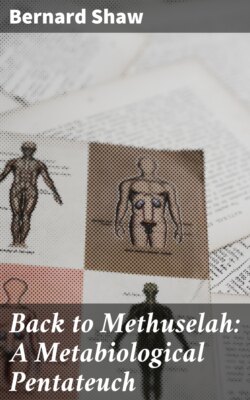Читать книгу Back to Methuselah: A Metabiological Pentateuch - Bernard Shaw - Страница 24
На сайте Литреса книга снята с продажи.
IN QUEST OF THE FIRST CAUSE
ОглавлениеTable of Contents
Another reminiscence. In those days we thought in terms of time and space, of cause and effect, as we still do; but we do not now demand from a religion that it shall explain the universe completely in terms of cause and effect, and present the world to us as a manufactured article and as the private property of its Manufacturer. We did then. We were invited to pity the delusion of certain heathens who held that the world is supported by an elephant who is supported by a tortoise. Mahomet decided that the mountains are great weights to keep the world from being blown away into space. But we refuted these orientals by asking triumphantly what the tortoise stands on? Freethinkers asked which came first: the owl or the egg. Nobody thought of saying that the ultimate problem of existence, being clearly insoluble and even unthinkable on causation lines, could not be a causation problem. To pious people this would have been flat atheism, because they assumed that God must be a Cause, and sometimes called him The Great First Cause, or, in still choicer language, The Primal Cause. To the Rationalists it would have been a renunciation of reason. Here and there a man would confess that he stood as with a dim lantern in a dense fog, and could see but a little way in any direction into infinity. But he did not really believe that infinity was infinite or that the eternal was also sempiternal: he assumed that all things, known and unknown, were caused.
Hence it was that I found myself one day towards the end of the eighteen-seventies in a cell in the old Brompton Oratory arguing with Father Addis, who had been called by one of his flock to attempt my conversion to Roman Catholicism. The universe exists, said the father: somebody must have made it. If that somebody exists, said I, somebody must have made him. I grant that for the sake of argument, said the Oratorian. I grant you a maker of God. I grant you a maker of the maker of God. I grant you as long a line of makers as you please; but an infinity of makers is unthinkable and extravagant: it is no harder to believe in number one than in number fifty thousand or fifty million; so why not accept number one and stop there, since no attempt to get behind him will remove your logical difficulty? By your leave, said I, it is as easy for me to believe that the universe made itself as that a maker of the universe made himself: in fact much easier; for the universe visibly exists and makes itself as it goes along, whereas a maker for it is a hypothesis. Of course we could get no further on these lines. He rose and said that we were like two men working a saw, he pushing it forward and I pushing it back, and cutting nothing; but when we had dropped the subject and were walking through the refectory, he returned to it for a moment to say that he should go mad if he lost his belief. I, glorying in the robust callousness of youth and the comedic spirit, felt quite comfortable and said so; though I was touched, too, by his evident sincerity.
These two anecdotes are superficially trivial and even comic; but there is an abyss of horror beneath them. They reveal a condition so utterly irreligious that religion means nothing but belief in a nursery bogey, and its inadequacy is demonstrated by a toy logical dilemma, neither the bogey nor the dilemma having anything to do with religion, or being serious enough to impose on or confuse any properly educated child over the age of six. One hardly knows which is the more appalling: the abjectness of the credulity or the flippancy of the scepticism. The result was inevitable. All who were strong-minded enough not to be terrified by the bogey were left stranded in empty contemptuous negation, and argued, when they argued at all, as I argued with Father Addis. But their position was not intellectually comfortable. A member of parliament expressed their discomfort when, objecting to the admission of Charles Bradlaugh into parliament, he said 'Hang it all, a man should believe in something or somebody.' It was easy to throw the bogey into the dustbin; but none the less the world, our corner of the universe, did not look like a pure accident: it presented evidences of design in every direction. There was mind and purpose behind it. As the anti-Bradlaugh member would have put it, there must be somebody behind the something: no atheist could get over that.
